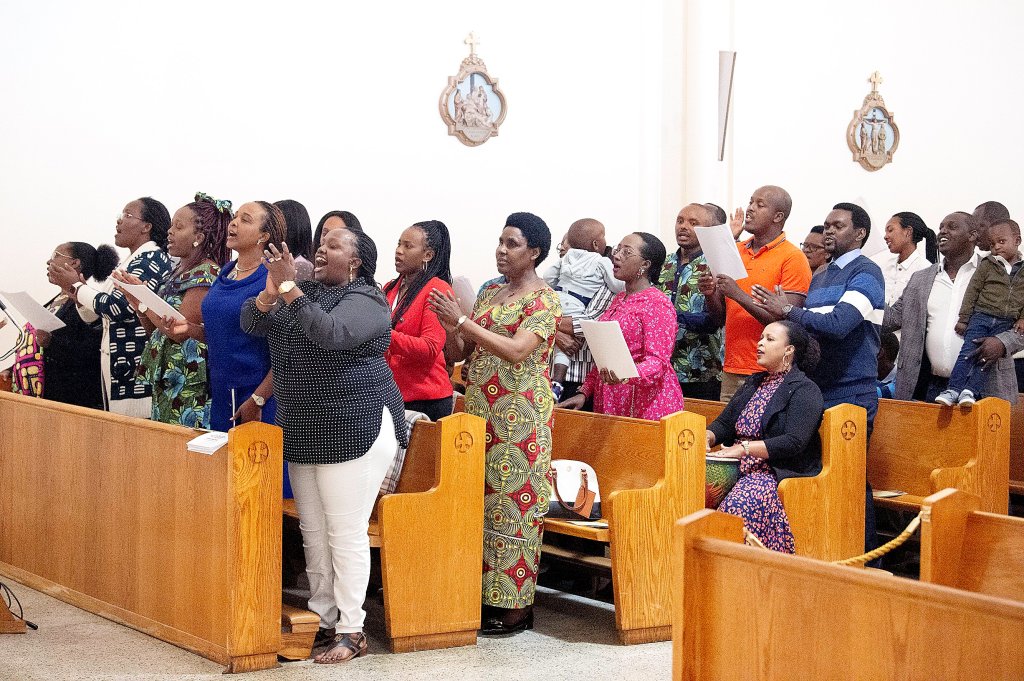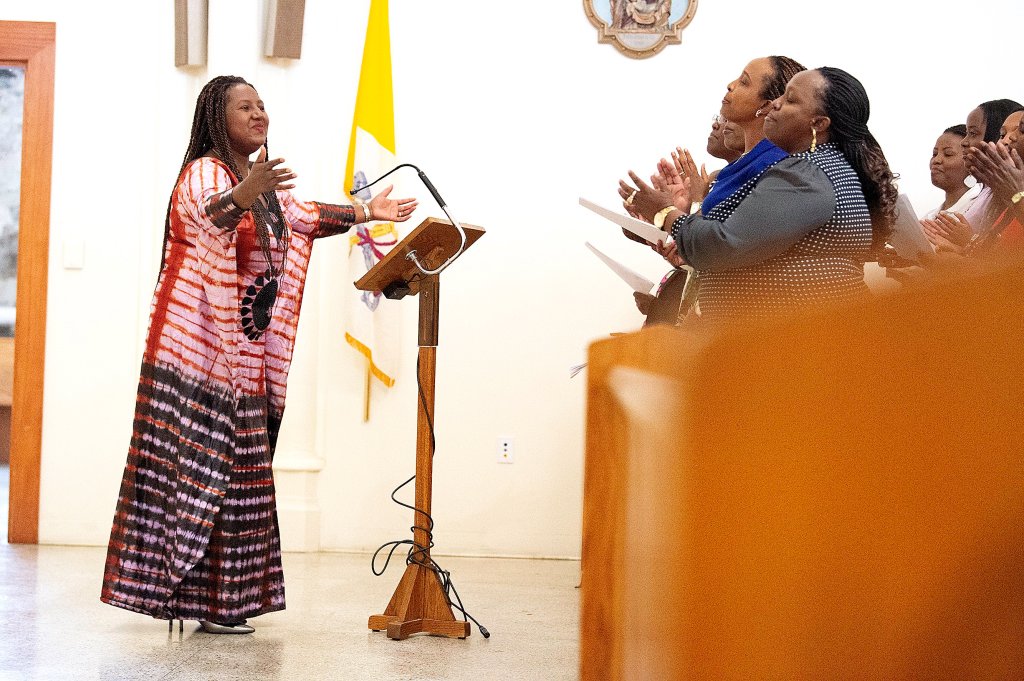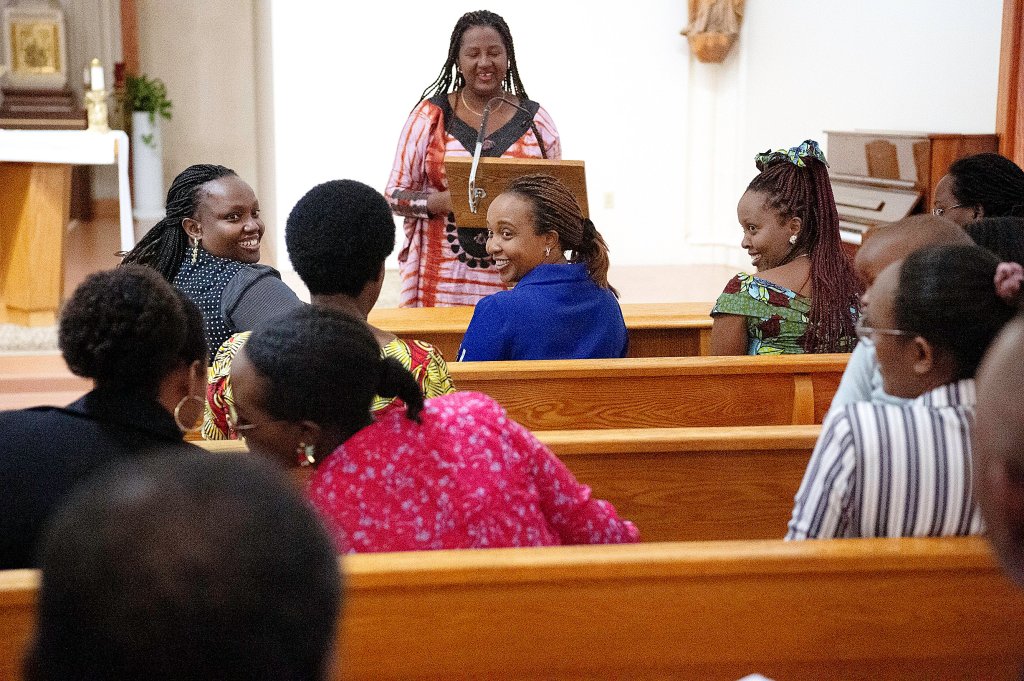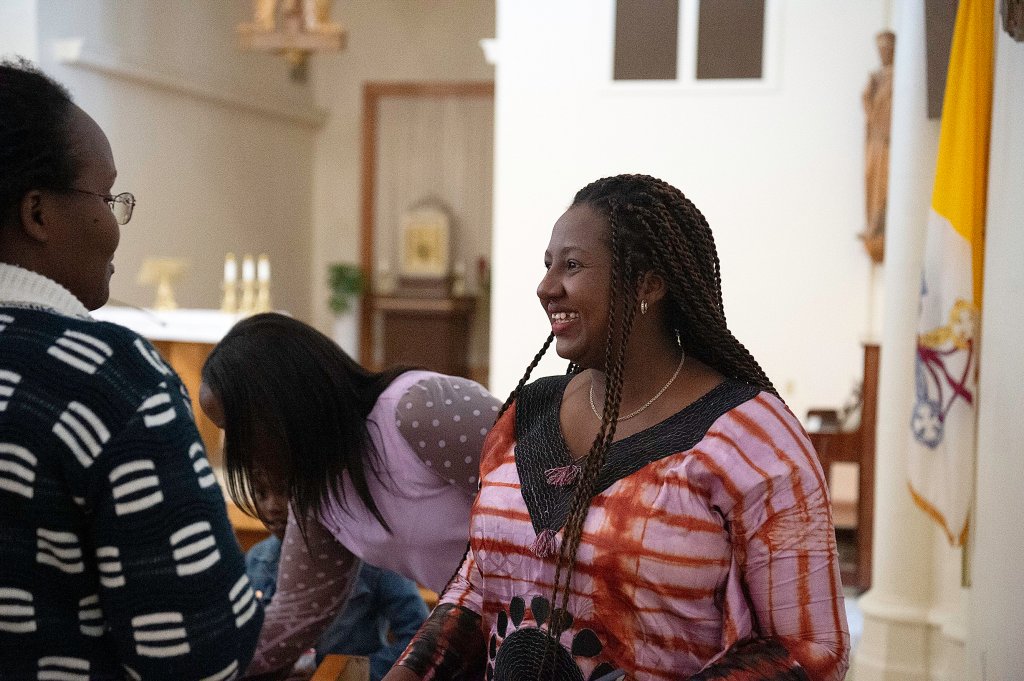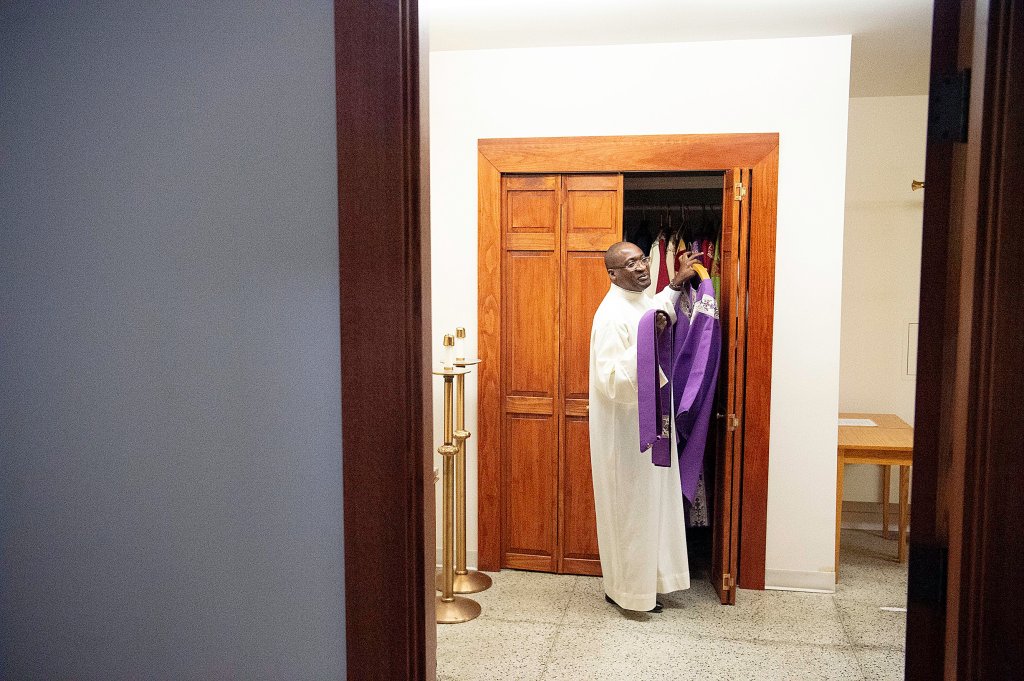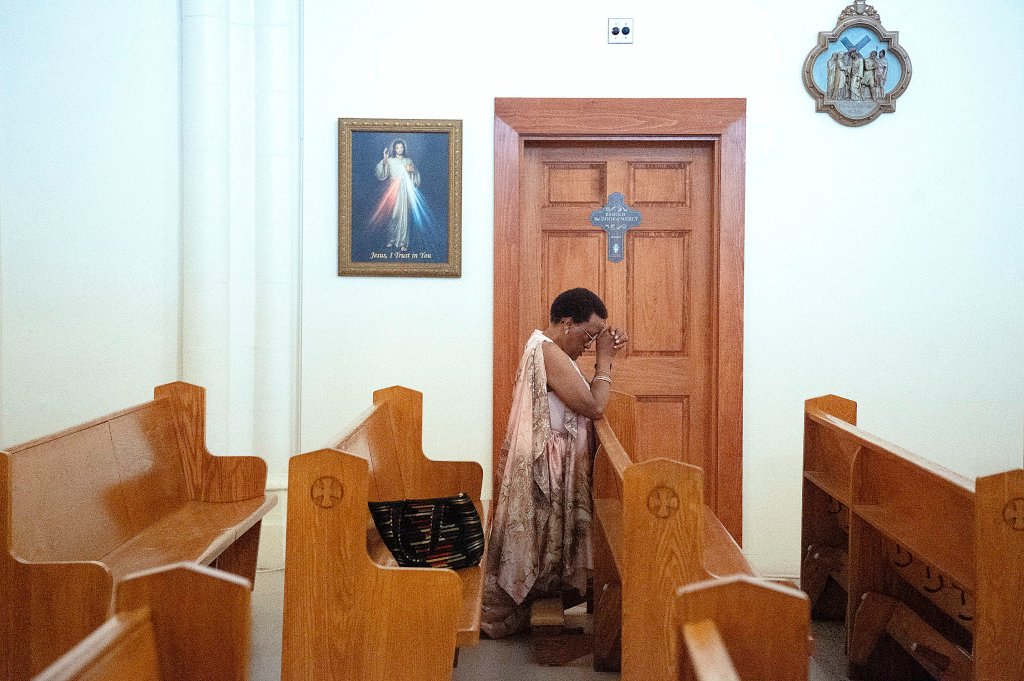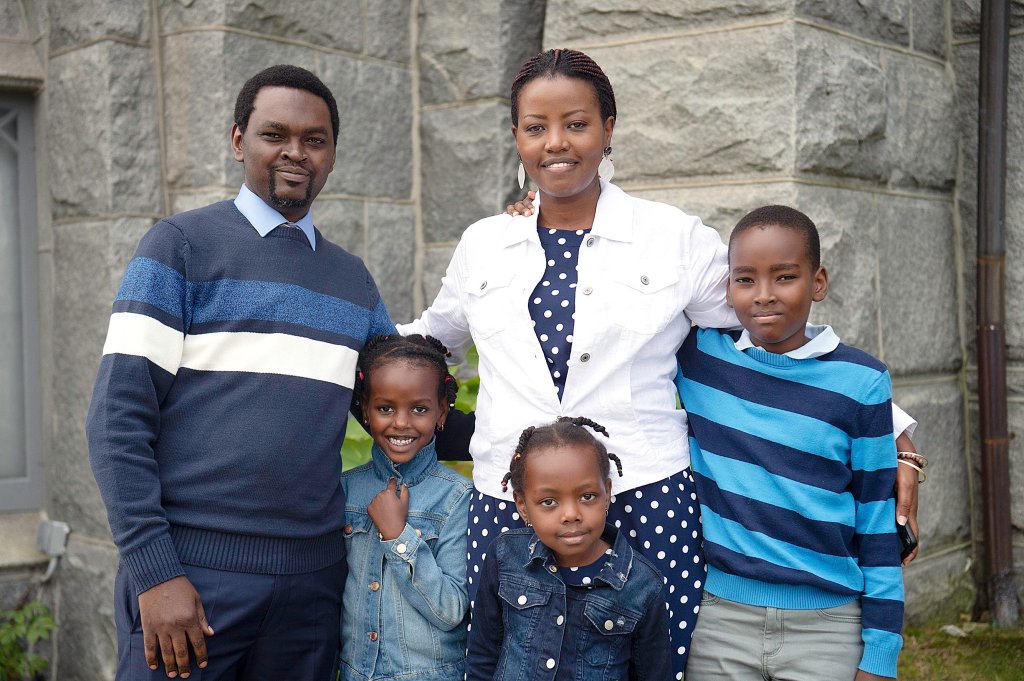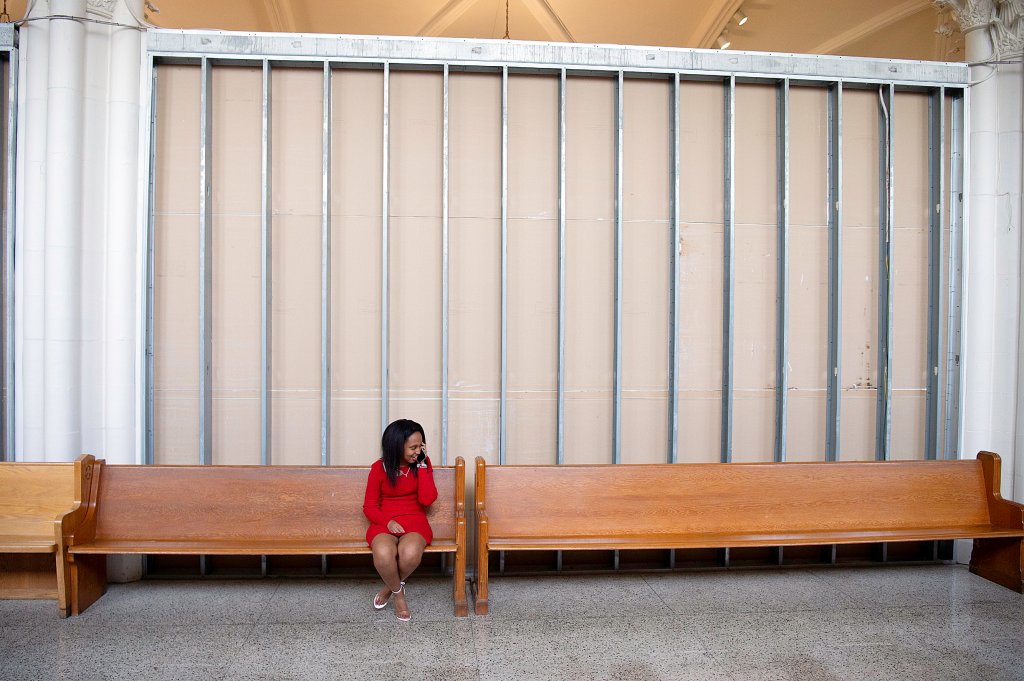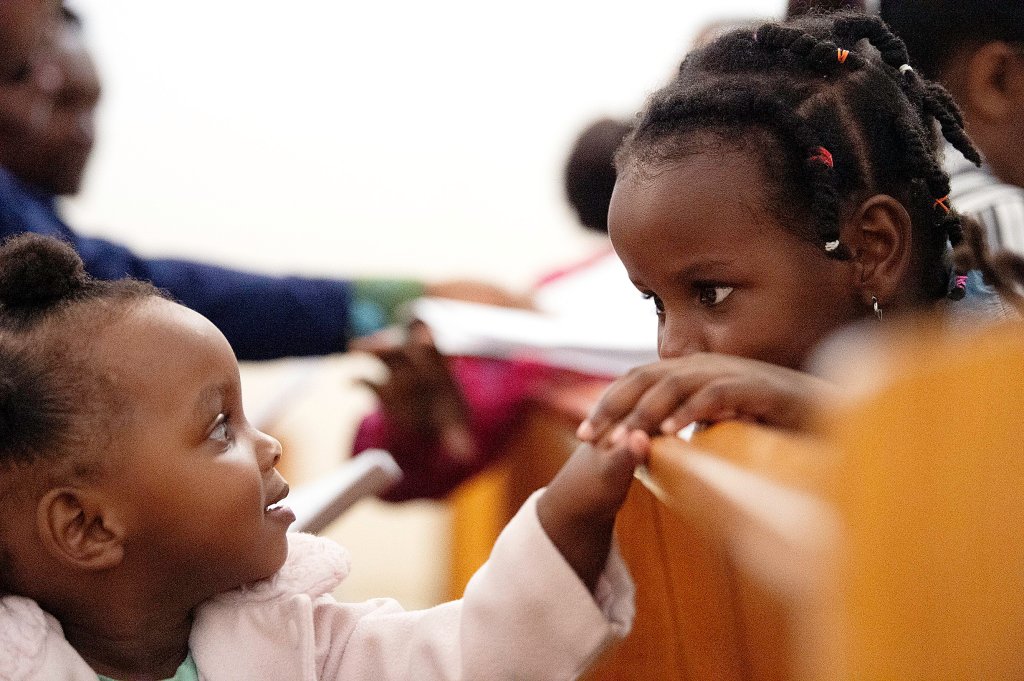LEWISTON — One hopes that God hears the quiet prayers of the meek, but there is no doubt that when the powerful voices of the Choir Notre Dame de la Paix soar within the Basilica of Saints Peter and Paul, everyone within earshot is listening, from earth to the heavens.
The choir gathers each month in a little chapel on the first floor of Lewiston’s astonishing basilica to sing during a Mass for Maine’s growing African community that’s celebrated in Kirundi, the primary language of Burundi.
A couple dozen people, mostly women, join in unison to sing familiar hymns from their impoverished but sunny homeland beside Lake Tanganyika.
The mix of music is simply breathtaking.
In their joy and booming delivery, choir members sound something akin to the famed Soweto Gospel Choir, with their lush a cappella melodies accompanied by a single goblet-shaped drum called a djembe providing an understated beat among the ascending voices.
[Listen to the final song by Choir Note Dame de la Paix performed during the Oct. 14 Mass at the basilica.]
Singing the old songs in French, Kirundi, and Kinyarwanda is comforting, several choir members said, offering them something of their former lives as they now live in this faraway land where nearly everyone speaks English
“It’s like I’m back home,” said Francine Ndayikengurutse, who moved to Lewiston seven years ago.

Dancile Nshimirimana directs the Choir Notre Dame de la Paix during Mass Oct. 15 at the Basilica of Saints Peter and Paul in Lewiston. Daryn Slover/Sun Journal
“It means a lot to us,” said Clovis Ihahore, who came to Maine almost five years ago with his wife, arriving in January amidst cold so bitter that his wife cried at the thought of making a home in snowy Lewiston.
But make a home they did.
Though Ihahore, who’d worked with computers for a United Nations agency in Burundi, had trouble finding a job, he’s now employed by the Lewiston Public Schools.
“We trust in God,” said Dancile Nshimirimana, the outreach coordinator with Prince of Peace Parish in Lewiston who came to the community in 2015 from Burundi and who helped create the new Mass to help ease the path for immigrants trying to establish themselves in a new world.
Ihahore now has a house, children and faith that for his family, coming to America was worth it.
Below the vaulted ceilings of the chapel – which hold the weight of the huge stone basilica above – Ihahore was one of about 70 people who showed up for the African Mass on a mid-October Sunday afternoon.
The choir arrived early to practice for 20 minutes or so before Father Felix Barutwanayo, a Jesuit priest doing graduate work at Boston College, walked in with his green vestments to conduct a Mass whose only English words were part of a brief welcome.
But even in Kirundi, a Bantu language spoken by most people in Burundi, the cadences and form of much of the Mass were familiar enough that few who spend any time in a Roman Catholic church would fail to recognize them.

Father Felix Barutwanayo prepares to conduct Mass Oct. 15 at the Basilica of Saints Peter and Paul in Lewiston. Daryn Slover/Sun Journal
Barutwanayo called the Mass for the immigrant community “very important.”
“For them, it helps them to connect to their roots,” he said, and by listening to the words in their native tongue, it also allows them “to connect more with God.”
He said he’s glad to make the trek to Lewiston once a month to lend a hand to the community still learning English, still finding their way in a new land.
“We are here for the people,” the priest said, and this presents “a rare opportunity for us to serve” parishioners who have unique needs.
The African Mass, Barutwanayo said, “brings them together.”
During the Mass, choir members and congregants were all on their feet, swaying as they sang, often with huge smiles, sometimes clapping lightly or raising their arms. Bright-eyed youngsters sometimes joined in.
Nshimirimana said she pushed to have the special Mass because she saw immigrant families drifting away from the church because they couldn’t understand the words. Some of the Protestant churches, she said, were having people preach in languages the African diaspora in Maine could follow more easily.
She said that when she raised the issue with church leaders, they agreed to give her idea of an African Mass a try.

Emma Nbabitunzentyo prays during African Mass Oct. 15 at the Basilica of Saints Peter and Paul in Lewiston. Nbabitunzentyo, of Portland, wanted to come to Mass at the Basilica to help celebrate her 65th birthday, which fell the next day. Daryn Slover/Sun Journal
Most of the people in Burundi are Christian, with 61% Catholic and 21% Protestant, according to the U.S. State Department’s Office of International Religious Freedom.
Barutwanayo said it strikes him how meaningful the Mass and his presence are when he hears confession from some of the immigrants. They don’t have any way to talk to priests who don’t know their language, he said, and that connection is crucial.
Kirundi is the language spoken by the vast majority of people in Burundi, with French and English also considered official languages.
The Mass and the choir both have their roots in a 2017 wedding in Lewiston at which an immigrant from Rwanda managed to get a visiting priest from Boston to come to Maine to offer the ceremony’s liturgy in their native language.
Ndayikengurutse said that’s where she first sang with some of the men and women who now make up the Choir Notre Dame de la Paix.
Nshimirimana said that for the last few years, the Masses have been held monthly and draw a decent crowd to what the basilica calls its Little Chapel, located below the vast sanctuary on the floor above.
She said it attracts those who want a piece of home and those who are finding it hard to get involved in their new country.
“I’ve seen the struggle for new people coming,” Nshimirimana said, and she’s witnessed their joy in finding a Mass in Kirundi where they feel completely welcome.
She said those attending mostly live in Lewiston, but some come from farther afield, including regulars from Portland.

Children glance over the pew during African Mass Oct. 15 at the Basilica of Saints Peter and Paul in Lewiston. Daryn Slover/Sun Journal
The choir became an organized group in July 2022, Nshimirimana said, and has mostly sung for the services at the basilica. It has, though, also sung for students at Saint Dominic Academy in Auburn.
Nshimirimana said the music helps everybody feel more a part of the service.
She said she’s happy to see so many participating.
“I sing the way I used to sing,” Ndayikengurutse said.
Barutwanayo said the congregation he sees from the altar is a happy one.
For them, he said, “this feels like home.”
Send questions/comments to the editors.


